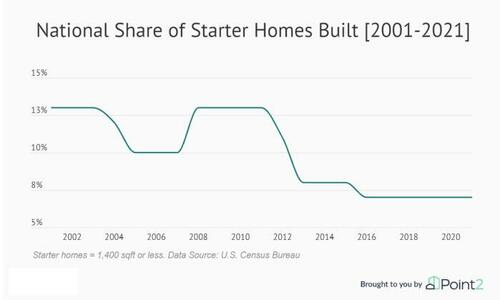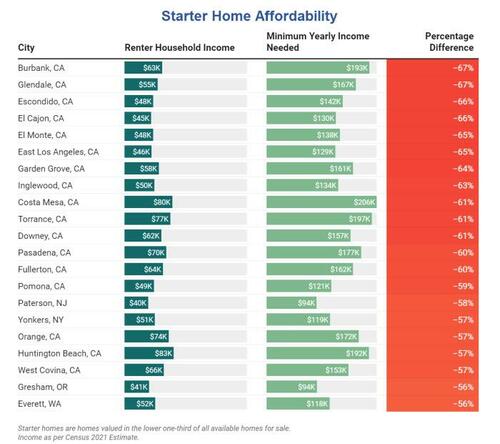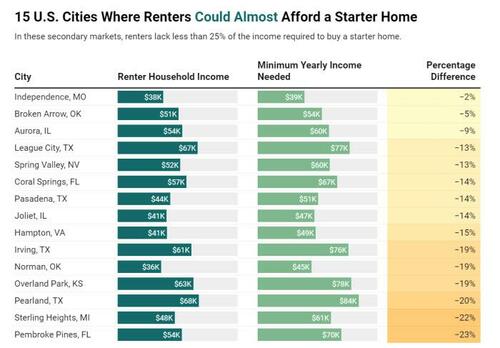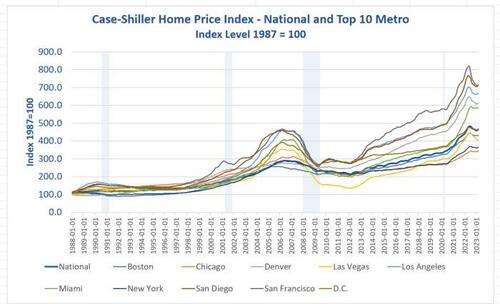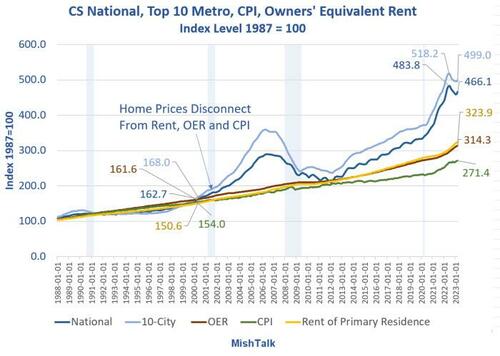The Starter Home Is No More, Even In Second Tier Markets
By Mish Shedlock of MishTalk
Renters dreaming of homeownership are priced out of secondary cities they might’ve flocked to years ago.
Starter Homes Long Past Affordability
Point2Home notes First-Time Buyers, Second Thoughts: Starter Homes Long Past Affordability, Even in Secondary Markets
With main markets no longer an option for first-time buyers, Point2 looked at the country’s 100 largest secondary cities for the median price of a starter home and renter households’ median income. Defined as large non-core cities within a metro, these cities used to be fruitful house-hunting grounds for first-time buyers exploring less-expensive options away from main cities. But as it turns out, unaffordability can put a dent in homeownership plans regardless of city type or size.
That’s because secondary cities — orbiting the principal cities within their respective metros — have seen increased competition from real estate investors, second-home buyers, and even downsizing Baby Boomers. As a result, this pushed the already scarce affordable options even further out of reach of those looking to get on the property ladder. Add sky-high prices and interest rates to the mix and you’ve got the recipe for postponing buying and renting until further notice — which is the case for the vast majority of Americans navigating today’s housing market.
Key Points
-
In 41 of the 100 largest secondary cities in the U.S., renters earn half or less than half of the income they would need to buy a median-priced starter home.
-
There are no non-core cities in which renters could comfortably make a move toward homeownership: In 10 cities, the necessary income is about triple what they earn.
-
Would-be buyers in Burbank and Glendale, CA have it worst: They lack 67% of the income they would need in order to make the move from renter to homeowner.
-
Renters in 9 California cities would need to earn about $100,000 more in order to afford a starter home. Based on the latest renter income figures, starter home prices, and mortgage rates, non-core cities in the LA and San Diego metros are the toughest for first-time homebuyers.
-
In 15 of the 100 largest secondary cities, renters would need less than 4 months’ worth of extra income to afford the transition to owning a starter home.
-
Homeownership is within reach in Independence, MO, and Broken Arrow, OK. Those who dream of owning here would need less than one month’s worth of extra income to afford a starter home.
California Tops the List of Worst Places to Look
California has the dubious distinction of having the top least affordable starter home cities.
A starter home, according to the Census Department is priced in the bottom third of homes in the area.
Pomona, CA, is in fourteenth place. The average renter in Pomona makes $49,000 a year and needs to get to $121,000 a year. That’s nearly 2.5 times current salary.
In Burbank, CA, the average renter makes $63,000 year an needs to get to $193,000. That’s over 3 times current salary.
Within Grasp
In no market can the average renter make the plunge.
But in Independence, Missouri, or Broken Arrow, Oklahoma, the average renter is respectively just 2% and 5% short of the amount needed for a starter home
Not Shocking
None of this is shocking. It matches one one should expect looking at Case-Shiller home prices and mortgage rates.
The Fed wanted to produce inflation and it did. But for years the Fed did not even see the inflation because the manifestation of inflation was in asset prices, not the price of consumer goods.
Case-Shiller Top City Home Prices Decline From Year Ago for the First Time Since May 2012
On May 30, I noted Case-Shiller Top City Home Prices Decline From Year Ago for the First Time Since May 2012
However, the decline is but a drop in the bucket compared to price increases since 2011.
Meanwhile, the average mortgage rate is 6.89 percent according to Mortgage News Daily.
Until the price of homes crash, or prices steady and mortgage rates crash, those looking to buy an affordable starter home will be out of luck.
This has widespread implications for household formation and the economy.
Tyler Durden
Thu, 06/08/2023 – 15:05
Zero Hedge’s mission is to widen the scope of financial, economic and political information available to the professional investing public, to skeptically examine and, where necessary, attack the flaccid institution that financial journalism has become, to liberate oppressed knowledge, to provide analysis uninhibited by political constraint and to facilitate information’s unending quest for freedom. Visit https://www.zerohedge.com
